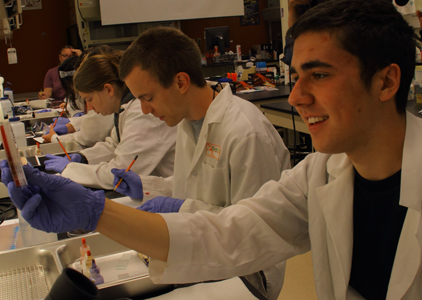Germ Forensics

"This is the best workshop of Summer Study," said Teryn Allen and Theresa Britschgi of Seattle Biomedical Research Center at the kick-off the Germ Forensics workshop. As Interns, we had the opportunity to participate in this super amazing class along with Phase II Scholars Allegra, Shelby, Anna, Chris, Alex, and Reese.
We started off the week testing our own bacterial flora using samples from our armpits, toes, eyelashes, and even beards. We then cultured the sampled bacteria on agar plates and made slides, so we could view the bacteria under a microscope.
Then we learned about the HIV virus in the HIV Testing and Epidemiology of Transmission lab. We learned that the HIV virus tends to replicate rapidly in infected people's blood, and in response to this, patients will start making HIV-specific antibodies and T cells. The presence of HIV-specific antibodies in the blood can be tested using a biochemical technique.
To conduct our own HIV test, we went back to the lab. One of the tools we used was a micropipette. This tool dispenses liquid in the range of microliters. For some of us it was the first time working with micropipettes, so we practiced for a while before we did an actual lab test. To conduct the test we coated the bottom of a well plate with an HIV protein. Patient serum was then added to each well, and, if HIV-specific antibodies were present, they would bind to the HIV protein.
In addition to learning about bacteria and HIV testing, we learned about malaria, how to test for bacteria-killing agents, and tuberculosis. Thank you to Teryn and Theresa for teaching us more about bacteria and germs. You were right, it WAS the best workshop of Summer Study!